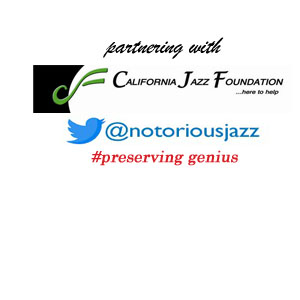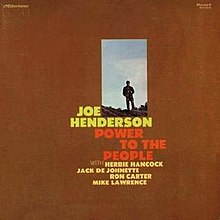
The Quarantined Jazz Voyager
POWER TO THE PEOPLE 11.12.20
As I sit socially distanced from the rest of the world ever vigilant of this pandemic, the next choice from the library is Power To The People by jazz saxophonist Joe Henderson. The album was recorded on May 23 and May 29, 1969 at Plaza Sound Studios in New York City and released on Milestone Records the same year.
Produced by Orrin Keepnews, all songs are written by Henderson except Opus One-Point-Five and Lazy Afternoon. It was his first to feature an electric instrument with Hancock playing the electric piano. This Quarantined Jazz Voyager is looking forward to listening to this lineup of talented musicians.
Track Listing | 42:27- Black Narcissus ~ 4:50
- Afro-Centric ~ 7:00
- Opus One-Point-Five (Ron Carter) ~ 4:56
- Isotope ~ 4:53
- Power to the People ~ 8:42
- Lazy Afternoon (Moross, Latouche) ~ 4:33
- Foresight and Afterthought (An Impromptu Suite in Three Movements) ~ 7:33
- Joe Henderson — tenor saxophone
- Mike Lawrence — trumpet (2, 5)
- Herbie Hancock — piano (3, 4, 6), electric piano (1, 2, 5)
- Ron Carter — bass
- Jack DeJohnette — drums
As you listen I hope you enjoy this great addition to the jazz catalog. Continue your social distancing, wear your masks and stay healthy. During this sabbatical from flying and investigating jazz around the globe, enjoy the listen and know that the world and I will be back.
More Posts: adventure,club,genius,jazz,museum,music,preserving,restaurant,saxophone,travel,voyager
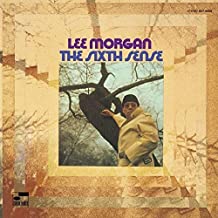
Requisites
The Sixth Sense ~ Lee Morgan | By Eddie Carter
Mention trumpeter Lee Morgan during his years at Blue Note and one of seven albums usually comes to mind. Blue Train (1957), Art Blakey and The Jazz Messengers (1958), Leeway (1961), The Sidewinder and Search For The New Land (1964), Cornbread (1967), and The Gigolo (1968). All are considered choice selections for any library featuring the talented bandleader and composer. Lee was the youngest musician in Dizzy Gillespie’s orchestra, joining the band at age eighteen and further honed his skills with The Jazz Messengers from 1958 to 1961.
Drug addiction temporarily derailed his career from 1961 to 1963, but he emerged stronger and got his life back on track, recording prolifically as a leader and sideman. The Sidewinder became his biggest-selling album and greatest success, changing all Blue Note releases that followed. The Sixth Sense (Blue Note BST 84335) hit the stores in 1969 featuring one of his best groups. Jackie McLean on alto sax, Frank Mitchell on tenor sax, Cedar Walton on piano, Victor Sproles on bass, and Billy Higgins on drums complete the ensemble. My copy used in this report is the 1969 Liberty Records Stereo album.
The Sixth Sense, the first of four tunes by the leader kicks off Side One with a relaxing drum introduction by Billy, segueing into an intriguing Bossa Nova styled melody led by the front line. Lee solos first, pacing himself at an easy swing with plenty of feeling. Frank displays his inventive ability with a passionately frisky tone next, then Jackie takes flight on a solo full of tasty grooves. Cedar comes next, conveying an abundance of youthful energy, and Billy exchanges a spirited conversation with Lee leading to the ensemble’s closing chorus and fadeout.
Short Count, the second Morgan tune takes an aggressive uptempo approach to the melody vigorously. McLean charges out of the gate, almost stealing the show with incandescent intensity anchored by Lee and Frank on his final verse. Morgan raises the temperature a few more degrees to a level of feisty assertiveness on the next reading. Mitchell applies some high voltage to the third interpretation. Walton delivers the final enthralling statement before the quintet takes the song out.
Morgan’s Psychedelic will set your body in motion and have you dancing from the rhythm section’s leisurely flowing introduction to the infectious theme. Lee establishes the relaxing atmosphere on the opening chorus with bluesy lines. Frank shows some improvisational creativity on the next performance. Jackie takes over for some fine blowing and Cedar keeps things interesting with nimble fingers until the ensemble’s fadeout.
Afreaka is Cedar Walton’s contribution to the album, starting Side Two with an Afrobeat flavor possessing a very interesting rhythm that’s also danceable. Morgan, McLean, Mitchell, and Walton are the principal soloists providing plenty of musical inspiration. Anti-Climax, the final tune from the trumpeter’s pen begins with a brief bass introduction by Victor preceding the sextet’s upbeat theme treatment. Lee opens the first solo with inspired agility, then Jackie charges into the second statement with a dazzling improvisation. Frank infuses the next presentation with strong-lined lyricism, and Cedar finishes with an aggressive reading preceding the ending.
The Cry Of My People by trumpeter Cal Massey ends the album with a gorgeous quartet number by Morgan and the trio. Lee begins the melody with a hauntingly elegant-muted performance, picking up the pace gradually for his exceptionally pretty opening statement. Cedar gets a brief moment to share his thoughts with evocative softness, then Lee returns with so much sensitivity and feeling, it’ll bring tears to your eyes. The sound quality on The Sixth Sense is superb with all six instruments full of body, presence, and a vibrantly, clear sound.
Lee Morgan was an exceptional composer and musician who possessed an exciting, relentless drive. He recorded twenty-five albums for Blue Note as a leader and appeared as a sideman on countless others, elevating each record to something special. But changes were on the way as AllMusic.com reviewer Michael G. Nastos describes. “The appropriate title Sixth Sense presents a transition between one of the most intriguing sextets during the last years of post-bop and Morgan’s final ensembles that saw him reaching higher and higher before, like Icarus, falling from grace”.
Lee would die tragically from a gunshot wound by his common-law wife Helen Morgan on February 19, 1972, after an altercation while performing at jazz club Slug’s Saloon in New York City. He left an incredible body of music also recording for Savoy, Vee-Jay, and Jazzland that still amazes and thrills fans around the world. At just over thirty-nine minutes, The Sixth Sense by Lee Morgan is an excellent album that you’ll play again and again, and a must-have for any Hard-Bop fan’s library!
~ Quote by Michael G. Nastos – Source: AllMusic.com~ Art Blakey and The Jazz Messengers (Blue Note BLP 4003/BST 84003); Blue Train (BLP 1577/BST 81577); Cornbread (BLP 4222/BST 84222); Leeway (BLP 4034/BST 84034); Search For The New Land (BLP 4169/BST 84169); The Gigolo (BLP 4214/BST 84214); The Sidewinder (Blue Note BLP 4157/BST84157) – Source: Discogs.com
~ Lee Morgan, Helen Morgan – Source: Wikipedia.org © 2020 by Edward Thomas Carter
More Posts: choice,classic,collectible,collector,history,instrumental,jazz,music
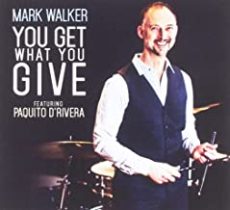
Daily Dose Of Jazz…
Mark Walker was born on October 16, 1961 in Chicago, Illinois and began playing drums at age ten. He played his first professional club, concert, and recording gigs barely out of high school. After studying with Roy C. Knapp, he gained valuable experience performing a wide range of styles in the Chicago, area and later became a first-call session drummer and percussionist, playing on film scores, jingles, and record dates.
Moving to New York in 1995, he easily entered the jazz culture and performed and recorded extensively with Michel Camilo, Dave Samuels, Andy Narell, WDR Big Band, NDR Big Band, Grace Kelly, Eliane Elias, Lyle Mays, Dave Liebman, Regina Carter, Joao Bosco, Dianne Reeves, Cesar Camargo Mariano, and Rosa Passos, among numerous others. He has been earned several Grammy nominations and in 2008 he was nominated for a Grammy for Best Instrumental Composition.
Walker has worked on Grammy~winning albums with Oregon, Donato Poveda, Paquito D’Rivera, the Caribbean Jazz Project and has also earned Indy and Jazz awards. He appeared on Late Night with David Letterman, The Rosie O’Donnell Show, PBS Presents, BET On Jazz, and with Paquito D’Rivera in Fernando Trueba’s Latin jazz documentary Calle 54.
As an educator, Mark is a professor in the Percussion Department at Berklee College of Music where he has taught drummers, percussionists, and ensembles since 2001. He has served on the faculty at New York City’s Drummers Collective and has conducted master classes, clinics, and workshops in South America, North America, and Europe. He has published two books, World Jazz Drumming and Killer Grooves, an instructional drum set book.
Grammy Award-winning drummer, percussionist, author, and educator Mark Walker continues to tour with Oregon and Paquito D’Rivera. He writes for and leads Rhythm of the Américas, a jazz octet incorporating Caribbean and South American rhythms.
More Posts: bandleader,composer,drums,history,instrumental,jazz,music
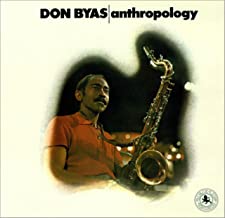
Requisites…
<Anthropology~Don Byas | By Eddie Carter
I begin this morning’s discussion with an album by tenor saxophonist Don Byas, a swing and bebop musician who played in the orchestras of Count Basie, Duke Ellington, and Lionel Hampton. He also worked with Art Blakey, Dizzy Gillespie, Bud Powell, and Ethel Waters among others. Anthropology (Black Lion Records BLP 30126) is a 1963 album that was recorded live at the Jazzhus Montmartre (also known as Café Montmartre). The rhythm section is an outstanding trio of Danish descent, pianist Bent Axen, bassist Niels-Henning Ørsted Pedersen and drummer William Schiöpffe. My copy used in this report is the US Stereo reissue (Black Lion BL-160), the date of release is unknown.
The album opens with Anthropology, a bebop classic written in 1945 by Dizzy Gillespie and Charlie Parker that’s also known as Thriving From a Riff or Thriving on a Riff. Schiöpffe introduces the tune, preceding the leader’s feisty delivery of the melody. Byas takes the lead with a compelling lift to start the soloing, then Axen executes the second reading efficiently. Pedersen turns in a brief presentation closely shadowed by Byas and Schiöpffe ends the readings by exchanging a few splendid phrases with the leader.
Moonlight In Vermont was written in 1944 by John Blackburn and Karl A. Suessdorf. This timeless evergreen provides a perfect backdrop for Byas’ gorgeous melody. The saxophonist continues with a very dreamy interpretation of the slow-paced, serene opening solo. Bent follows, displaying a graceful elegance on the next performance with discreet, perfectly tailored support by Niels-Henning and William. Byas’ closing chorus is lovingly rendered, completing the song with a tender finale that’s gorgeous.
Charlie Parker’s 1945 bebop anthem Billie’s Bounce ends the first side with a spirited rendition by the quartet. Pedersen and Schiöpffe open the song as a duet that becomes a lively theme treatment. Don raises the temperature on the lead solo with an effervescent beat that energizes the trio. Bent takes the spotlight last hitting a perfect groove on a swinging performance preceding the leader’s final remarks, theme’s reprise, and coda.
The gears shift upward for Dizzy Gillespie’s most famous recorded tune, Night In Tunisia was written in 1942 with Frank Paparelli. The rhythm section introduces the song at a speedy velocity proceeding to the aggressively energetic theme by Byas who also rips into the first solo voraciously. Bent takes the reins next zipping along like a whirlwind, then Don returns for a second exhilarating statement with bassist and drummer providing the fuel. NHØP takes over for an abbreviated scorcher, then Schiöpffe speaks last exhibiting mesmerizing brushwork into the invigorating climax.
The finale is the 1932 ballad, Don’t Blame Me, written by Jimmy McHugh and Dorothy Fields. This song made its first appearance on Broadway in the show, Clowns in Clover, and later in two films, The Bad and The Beautiful (1952) and Two Weeks in Another Town (1962). Byas begins with a delicate introduction and heart-warming melody ahead of a sultry first statement that’s exquisite. Axen expresses a gentle affection on the final solo preceding Byas who ends the song and LP with a tender sincerity.
In 1964, Byas was celebrating his third decade as a professional musician. In honor of that achievement, the LP was also released as The Big Sound – Don Byas’ 30th Anniversary Album on Fontana in the Netherlands and Debut Records in Denmark. Two songs on the original LP are omitted on Anthropology, There’ll Never Be Another You by Harry Warren and Mack Gordon and Walkin’ by Richard Carpenter. Don Byas was a masterful musician who was adept at a fast clip or on a romantic ballad.
He lived the last twenty-six years of his life in Europe, working extensively before passing away from lung cancer on August 24, 1972, at the age of fifty-nine. The dialogue between the quartet is fascinating and their music a treat for the Café Montmartre crowd. The album was produced by UK music executive Alan Bates who began Black Lion Records and also re-launched the Candid label in London. The sound quality is excellent, transporting the listener to the club amid the crowd. Though out of print for many years, Anthropology is a remarkable live album by Don Byas that I not only recommend but am sure will become a welcome addition in any library.
~ Alan Bates, The Big Sound – Don Byas’ 30th Anniversary Album (Debut Records DEB-142, Fontana 688 605 ZL) – Source: Discogs.com ~ Moonlight In Vermont, Night In Tunisia – JazzStandards.com ~ Don’t Blame Me – Source: Wikipedia.org © 2020 by Edward Thomas Carter
More Posts: choice,classic,collectible,collector,history,instrumental,jazz,music,saxophone
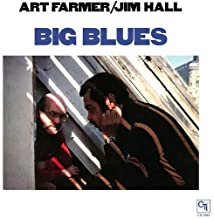
Requisites
Big Blues ~ Art Farmer & Jim Hall | By Eddie Carter
This next choice from the library I acquired after hearing a selection on SiriusXM’s Real Jazz channel. The album is titled Big Blues (CTI Records CTI 7083), released in 1979 and the two men co-leading this enjoyable date are Art Farmer on flugelhorn and Jim Hall on guitar. Rounding out the ensemble are Mike Mainieri on vibes, Mike Moore on bass, and Steve Gadd on drums. My copy used in this report is the 2017 ORG Music Stereo Audiophile reissue (ORGM-2019).
The song that initially sparked my interest leads off the first side, Benny Golson’s 1956 contemporary jazz classic, Whisper Not! It’s one of his most recorded compositions and also became a beloved vocal after Leonard Feather added lyrics in 1962. The quintet jointly creates a mellow melody with a blues beat to begin the song. Jim makes his guitar sing first with a relaxed casualness and steady rhythm. Art gets into an infectious laid-back groove next moving upward with bright chops and impeccable prowess. Mike takes over for the finale with an astonishing drive and intensity preceding the reprise and gentle coda.
The 1969 jazz standard, A Child Is Born by Thad Jones closes the first side starting gently with a brief introduction and tender theme by the rhythm section. Farmer starts the soloing with a ravishingly beautiful, muted performance, followed by Hall who delivers passionately elegant lines on the next interpretation. Mainieri gives a delicately gentle and evocative presentation recalling the spirit and imagination of the song’s composer into the serenely beautiful climax. Big Blues by Jim Hall starts the second side with a spirited midtempo opening chorus by the ensemble and the solo order is the same as on Whisper Not. Jim takes the lead here, showing us his versatility with charming articulation. Art follows, using the mute to deliver skillful assertion on the next reading. Mike’s closing statement is captivating from the moment it starts, expressing joy into the reprise and fadeout. Pavane For A Dead Princess by Maurice Ravel ends the album and was written as a solo piano piece in 1899. The song’s original title is Pavane pour une infante défunte (Pavane for a Dead Infanta) and the ensemble begins the introduction and melody at a slow tempo fitting the original composition. Farmer steps up first, back on the open horn, beginning as he did on the theme, then raises the temperature to midtempo before returning to a softer mood for the close. Mainieri pulls out all the stops on the next reading with a sparkling presentation. Hall takes the final bow with a gorgeous performance preceding the reprise and graceful fadeout.
Big Blues was originally produced by Creed Taylor and engineered by David Palmer who worked at Electric Lady Studios, and Joel Cohn who’s worked on many CTI albums. This reissue was mastered from the original analog tapes by Bernie Grundman and pressed on 180-gram Audiophile vinyl at Pallas Group in Germany. As was the case of many of the classic CTI Records, the sound quality is first-rate with an excellent soundstage across the highs, midrange, and low end that won’t disappoint the listener in their favorite spot to listen to music. Art Farmer and Jim Hall recorded together four other times, Interaction (1963), Live at The Half Note, To Sweden With Love (1964), and Panorama-Live at The Village Vanguard (1997). Each is highly recommended, and I feel the same can be said for Big Blues. I invite you to make time for this one on your next vinyl hunt, it’s an enjoyable album of Contemporary Jazz with extraordinary chemistry, and exceptional performances you won’t soon forget!
~ Interaction (Atlantic 1412/SD 1412); Live at The Half Note (Atlantic 1421/SD1421); Panorama-Live at The Village Vanguard (Telarc Jazz CD-83408); To Sweden With Love (Atlantic 1430/SD 1430) – Source: Discogs.com
~ Whisper Not, A Child Is Born ~ Source: JazzStandards.com
~ Pavane For A Dead Princess ~ Source: Wikipedia.org
© 2020 by Edward Thomas Carter
More Posts: choice,classic,collectible,collector,guitar,history,instrumental,jazz,music,trumpet


